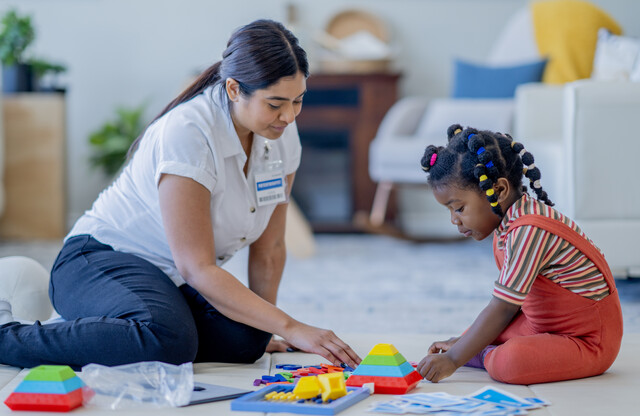Online Class: Building Self-Esteem in Children

-
13Lessons
-
32Exams &
Assignments -
5Hours
average time -
0.5CEUs
Course Description
Building Robust Self-Esteem in Children
Self-esteem is more than just a buzzword; it's the very foundation of confidence, resilience, and emotional health. Understanding the nuances of self-esteem can be the key to unlocking a child's potential. Dive into our course, "Building Self-Esteem in Children," and equip yourself with the tools to uplift, inspire, and fortify the young minds around you.
Our class transcends basic knowledge, delving into the profound intricacies of self-esteem's role at every pivotal stage of a child's life-from the tender moments of infancy, the discovery-filled elementary years, the tumultuous storms of middle and high school, to the introspective phase of young adulthood. Recognize, respond, and adapt to the unique challenges and opportunities each phase presents.
Words have power-more than we often realize. Our course emphasizes the lasting impact of the words we choose, teaching you to communicate with affirmation and positivity. Master the art of active listening, an invaluable skill in understanding and nurturing a child's self-worth. We will also guide you in shaping values and core beliefs, allowing children to anchor themselves in a world of rapid change.
Moreover, to truly resonate with children, introspection is key. This course encourages participants to embark on a personal journey, evaluating and bolstering their own self-esteem. By fostering a healthier self-view, you're better poised to be an influential beacon for young minds.
Embark on this transformative journey with us. Nurture self-esteem, cultivate potential, and lay the groundwork for a brighter, more empowered future. One child at a time, we have the power to change the world. Join us, and be that change.
Course Lessons
Lesson 1. The Importance of Self-Esteem
 Lesson 1 Video
Lesson 1 Video Review Practice Worksheet: Lesson-1-HomeWork-26990.pdf
Review Practice Worksheet: Lesson-1-HomeWork-26990.pdf Lesson discussions: Self-Esteem; Reasons for Taking this Course
Lesson discussions: Self-Esteem; Reasons for Taking this Course Assessment: Lesson 1: An Introduction to Self-Esteem
Assessment: Lesson 1: An Introduction to Self-Esteem Assessment: Lesson 1 Review Exam
Assessment: Lesson 1 Review Exam
Lesson 2. Building Self-Esteem in Infants: Responsive Parenting for a Confident Future
 Lesson 2 Video
Lesson 2 Video Review Practice Worksheet: Lesson-2-Activity-26991.pdf
Review Practice Worksheet: Lesson-2-Activity-26991.pdf Assessment: Lesson 2: Self-Esteem and Infancy
Assessment: Lesson 2: Self-Esteem and Infancy
Lesson 3. Guiding Autonomy and Building Self-Esteem in the Early Years
 Lesson 3 Video
Lesson 3 Video Review Practice Worksheet: Lesson-3-HomeWork-26992.pdf
Review Practice Worksheet: Lesson-3-HomeWork-26992.pdf Complete: Lesson 3 Activity
Complete: Lesson 3 Activity Assessment: Lesson 3: Self-Esteem and the Toddler Years
Assessment: Lesson 3: Self-Esteem and the Toddler Years Assessment: Lesson 3 Review Exam
Assessment: Lesson 3 Review Exam
Lesson 4. Essentials of Childhood: Navigating the Pivotal School Years
 Lesson 4 Video
Lesson 4 Video Review Practice Worksheet: Lesson-4-WorkSheet-26993.pdf
Review Practice Worksheet: Lesson-4-WorkSheet-26993.pdf Assessment: Lesson 4: The Elementary and Middle Years
Assessment: Lesson 4: The Elementary and Middle Years
Lesson 5. Navigating the Complex Pathways of Adolescence
 Lesson 5 Video
Lesson 5 Video Review Practice Worksheet: Lesson-5-HomeWork-26994.pdf
Review Practice Worksheet: Lesson-5-HomeWork-26994.pdf Complete: Lesson 5 Activity
Complete: Lesson 5 Activity Assessment: Lesson 5: Teen Years and Entering Adulthood
Assessment: Lesson 5: Teen Years and Entering Adulthood Assessment: Lesson 5 Review Exam
Assessment: Lesson 5 Review Exam
Lesson 6. Listening to Inner Voices: Unraveling Low Self-Esteem
 Lesson 6 Video
Lesson 6 Video Review Practice Worksheet: Lesson-6-StudyGuide-26995.pdf
Review Practice Worksheet: Lesson-6-StudyGuide-26995.pdf Complete: Lesson 6 Activity
Complete: Lesson 6 Activity Assessment: Lesson 6: Identifying Unhealthy Self-Esteem
Assessment: Lesson 6: Identifying Unhealthy Self-Esteem Assessment: Lesson 6 Review Exam
Assessment: Lesson 6 Review Exam
Lesson 7. The Silent Impact: Non-Verbal Cues in Building Confidence
 Lesson 7 Video
Lesson 7 Video Review Practice Worksheet: Lesson-7-WorkSheet-26996.pdf
Review Practice Worksheet: Lesson-7-WorkSheet-26996.pdf Complete: Lesson 7 Activity
Complete: Lesson 7 Activity Assessment: Lesson 7: Words Matter
Assessment: Lesson 7: Words Matter Assessment: Lesson 7 Review Exam
Assessment: Lesson 7 Review Exam
Lesson 8. Empowering Conversations: The Art of Listening Beyond Words
 Lesson 8 Video
Lesson 8 Video Review Practice Worksheet: Lesson-8-Activity-26997.pdf
Review Practice Worksheet: Lesson-8-Activity-26997.pdf Complete: Lesson 8 Activity
Complete: Lesson 8 Activity Assessment: Lesson 8: Importance of Active Listening
Assessment: Lesson 8: Importance of Active Listening Assessment: Lesson 8 Review Exam
Assessment: Lesson 8 Review Exam
Lesson 9. The Ripple Impact of Self-Worth
 Lesson 9 Video
Lesson 9 Video Review Practice Worksheet: Lesson-9-Downloadable-26998.pdf
Review Practice Worksheet: Lesson-9-Downloadable-26998.pdf Lesson discussions: Self-Esteem
Lesson discussions: Self-Esteem Complete: Lesson 9 Activity
Complete: Lesson 9 Activity Assessment: Lesson 9: Improving Your Own Self-Esteem
Assessment: Lesson 9: Improving Your Own Self-Esteem Assessment: Lesson 9 Review Exam
Assessment: Lesson 9 Review Exam
Lesson 10. Cultivating Values for a Lasting Legacy
 Lesson 10 Video
Lesson 10 Video Review Practice Worksheet: Lesson-10-StudyGuide-26999.pdf
Review Practice Worksheet: Lesson-10-StudyGuide-26999.pdf Assessment: Lesson 10: Defining Values and Core Beliefs
Assessment: Lesson 10: Defining Values and Core Beliefs Assessment: Lesson 10 Review Exam
Assessment: Lesson 10 Review Exam
Lesson 11. From Self-Esteem to Self-Realization: Balancing Confidence with Humility
 Lesson 11 Video
Lesson 11 Video Review Practice Worksheet: Lesson-11-HomeWork-27000.pdf
Review Practice Worksheet: Lesson-11-HomeWork-27000.pdf Complete: Lesson 11 Activity
Complete: Lesson 11 Activity Assessment: Lesson 11: Beyond Self-Esteem
Assessment: Lesson 11: Beyond Self-Esteem Assessment: Lesson 11 Review Exam
Assessment: Lesson 11 Review Exam
Lesson 12. Embracing Positivity Amid Adversity
 Lesson 12 Video
Lesson 12 Video Review Practice Worksheet: Lesson-12-HomeWork-27001.pdf
Review Practice Worksheet: Lesson-12-HomeWork-27001.pdf Assessment: Lesson 12: The Power of Positive Thinking
Assessment: Lesson 12: The Power of Positive Thinking Assessment: Lesson 12 Review Exam
Assessment: Lesson 12 Review Exam
Lesson 13. Culmination and Reflection: Integrating Self-Esteem Lessons
 Lesson 13 Video
Lesson 13 Video Review Practice Worksheet: Lesson-13-StudyGuide-27002.pdf
Review Practice Worksheet: Lesson-13-StudyGuide-27002.pdf Lesson discussions: Building Self-Esteem; Program Evaluation Follow-up Survey (End of Course); Course Comments; Reasons for Taking this Course
Lesson discussions: Building Self-Esteem; Program Evaluation Follow-up Survey (End of Course); Course Comments; Reasons for Taking this Course Assessment: Lesson 13: Putting it All Together
Assessment: Lesson 13: Putting it All Together Assessment: Final Exam
Assessment: Final Exam Assessment: Lesson 13 Review Exam
Assessment: Lesson 13 Review Exam
Learning Outcomes
- Demonstrate the ability to identify signs of unhealthy self-esteem in children and implement techniques to improve their confidence.
- Recognize the developmental stages of self-esteem in children and apply age-appropriate strategies to support their growth.
- Demonstrate understanding of the principles of attachment parenting by outlining at least two practices that build infant self-esteem and promote early development.
- Recognize and describe the impact of consistent caregiver responsiveness on infants' emerging self-esteem by identifying key behaviors.
- Define how exploration and positive feedback influence the development of self-esteem in toddlers by participating in structured activities and role-playing scenarios.
- Demonstrate strategies to nurture emotional intelligence in toddlers by identifying emotions and suggesting appropriate coping responses in various dynamic situations.
- Define the ways in which a supportive family and school environment can positively influence a child's self-esteem during elementary and middle school years.
- Identify strategies for counteracting peer pressure in middle school students through fostering self-identity and providing supportive networks.
- Analyze the role of media in shaping adolescent body image perceptions and develop critical thinking skills to evaluate and counteract unrealistic standards.
- Recognize the impact of societal and familial influences on adolescent self-esteem development and formulate strategies to foster positive self-identity.
- Demonstrate strategies to build a child's self-esteem by implementing mindful communication, encouraging independence, and creating a supportive environment.
- Recognize the signs of low self-esteem in children by identifying negative self-talk and avoidance behaviors through careful observation.
- Demonstrate an understanding of the impact of verbal and non-verbal communication on children's self-esteem by identifying three positive communication strategies.
- Demonstrate mastery of lesson content at levels of 70% or higher.
Additional Course Information

- Document Your Lifelong Learning Achievements
- Earn an Official Certificate Documenting Course Hours and CEUs
- Verify Your Certificate with a Unique Serial Number Online
- View and Share Your Certificate Online or Download/Print as PDF
- Display Your Certificate on Your Resume and Promote Your Achievements Using Social Media

Student Testimonials
- "It made me very sad because it educated me and triggered my own abuse. I also became infuriated because children do not get the treatment they deserve." -- Regina L.
- "This course was very helpful. I learned so much and I will be able to use what I have learned. Thanks." -- Mary S.
- "I really enjoyed this course and it will be really helpful to me as a primary school teacher." -- Melissa O.
- "I thoroughly enjoyed taking this course and believe it will be helpful in furthering my career." -- Savannah R.
- "The instructor was experienced in this subject. Great instructor." -- Iva E.
- "The instructor is great! Always available and accurate feedback." -- Lia S.
- "THIS COURSE ROCKED!" -- Seth M.
- "All the lessons were great and informative." -- Linda W.
- "It was very well organized and separated into different parts that flowed together." -- Leona R.
Related Courses
-
 10 hours
1.0 CEUs
Understanding Addictions
+ More Info
10 hours
1.0 CEUs
Understanding Addictions
+ More Info
-
 3 hours
0.3 CEUs
Understanding Learning Styles
+ More Info
3 hours
0.3 CEUs
Understanding Learning Styles
+ More Info
-
 5 hours
0.5 CEUs
Creative Thinking Skills
+ More Info
5 hours
0.5 CEUs
Creative Thinking Skills
+ More Info
-
 5 hours
0.5 CEUs
Positive Parenting Techniques
+ More Info
5 hours
0.5 CEUs
Positive Parenting Techniques
+ More Info
-
 8 hours
0.8 CEUs
Behavior Management 101
+ More Info
8 hours
0.8 CEUs
Behavior Management 101
+ More Info
-
 6 hours
0.6 CEUs
Confidence Building
+ More Info
6 hours
0.6 CEUs
Confidence Building
+ More Info
-
 11 hours
1.1 CEUs
ESL Basic Writing Skills
+ More Info
11 hours
1.1 CEUs
ESL Basic Writing Skills
+ More Info
-
 4 hours
0.4 CEUs
Stress Management
+ More Info
4 hours
0.4 CEUs
Stress Management
+ More Info
-
 7 hours
0.7 CEUs
Introduction to Child Psychology
+ More Info
7 hours
0.7 CEUs
Introduction to Child Psychology
+ More Info
-
 5 hours
0.5 CEUs
Emotional Intelligence
+ More Info
5 hours
0.5 CEUs
Emotional Intelligence
+ More Info
-
 3 hours
0.3 CEUs
Empowerment for Single Parents
+ More Info
3 hours
0.3 CEUs
Empowerment for Single Parents
+ More Info
-
 10 hours
1.0 CEUs
Contract Law 101 - An Introduction
+ More Info
10 hours
1.0 CEUs
Contract Law 101 - An Introduction
+ More Info
-
 9 hours
0.9 CEUs
ESL Grammar Skills Level 5
+ More Info
9 hours
0.9 CEUs
ESL Grammar Skills Level 5
+ More Info
-
 14 hours
1.4 CEUs
QuickBooks 101
+ More Info
14 hours
1.4 CEUs
QuickBooks 101
+ More Info
-
 7 hours
0.7 CEUs
The Science and Art of Reading Development
+ More Info
7 hours
0.7 CEUs
The Science and Art of Reading Development
+ More Info
-
 5 hours
0.5 CEUs
Child Safety for Parents
+ More Info
5 hours
0.5 CEUs
Child Safety for Parents
+ More Info
-
 17 hours
1.7 CEUs
Poetry Writing 101
+ More Info
17 hours
1.7 CEUs
Poetry Writing 101
+ More Info
-
 7 hours
0.7 CEUs
Understanding Concussions
+ More Info
7 hours
0.7 CEUs
Understanding Concussions
+ More Info
-
 10 hours
1.0 CEUs
Team Management and Leadership
+ More Info
10 hours
1.0 CEUs
Team Management and Leadership
+ More Info
-
 5 hours
0.5 CEUs
Listening Skills
+ More Info
5 hours
0.5 CEUs
Listening Skills
+ More Info
-
 5 hours
0.5 CEUs
Critical Thinking Skills
+ More Info
5 hours
0.5 CEUs
Critical Thinking Skills
+ More Info
-
 7 hours
0.7 CEUs
Innovative Thinking Skills
+ More Info
7 hours
0.7 CEUs
Innovative Thinking Skills
+ More Info
-
 6 hours
0.6 CEUs
Goal Setting for Business
+ More Info
6 hours
0.6 CEUs
Goal Setting for Business
+ More Info
-
 5 hours
0.5 CEUs
Depression Management
+ More Info
5 hours
0.5 CEUs
Depression Management
+ More Info
-
 5 hours
0.5 CEUs
Home Safety
+ More Info
5 hours
0.5 CEUs
Home Safety
+ More Info
-
 8 hours
0.8 CEUs
Assertiveness Training
+ More Info
8 hours
0.8 CEUs
Assertiveness Training
+ More Info
-
 6 hours
0.6 CEUs
Virus Removal and Protection
+ More Info
6 hours
0.6 CEUs
Virus Removal and Protection
+ More Info






